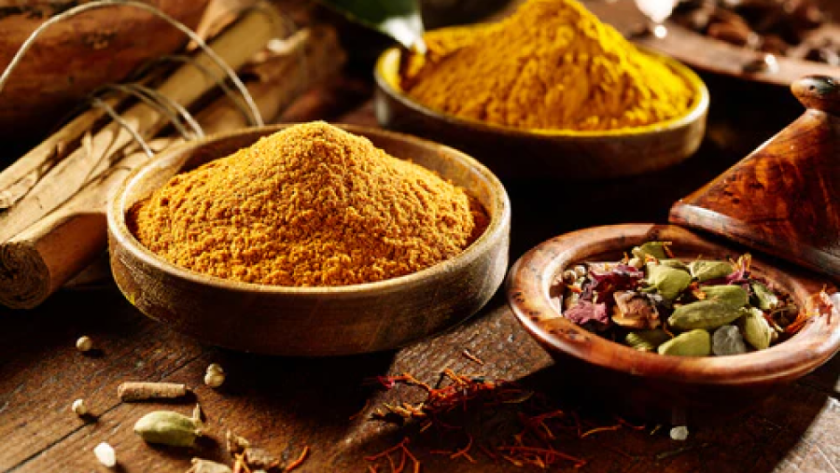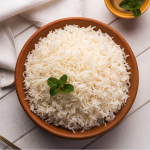There’s nothing wrong in calling Garam Masala the king of Indian spices. Literally, every Indian dish is incomplete without it. Although you can find a range of packaged garam masala online or at your nearby grocery store, there’s always one thing missing, and that’s the aroma. But wait! Why would you buy it from the market when you can make a perfect aromatic garam masala at home?
Making Garam Masala at home is super easy and doesn’t require many ingredients. You can even use spices from your kitchen pantry. However, we recommend making it in small batches as dry ground masala oxidizes over time and loses its strong aroma.
So today, we will share with you the super easy garam masala recipe, alongside listing all the required ingredients and detailed process.
What is Garam Masala?
Garam Masala is an Indian blend of different spices, each with its own aroma and taste, roasted and ground into a fine powder. As the name suggests, Garam means ‘Hot’ in Hindi, and this spice blend gives the body a hot effect. Due to this, it should be consumed in moderation during the summer season.
Apart from Indian cuisine, garam masala is a prime ingredient in many Pakistani, Bangladeshi, Nepalese, Sri Lankan, and Caribbean cuisines. The origin of garam masala is believed to be in North India, where it was a major part of traditional Mughlai dishes. In Ayurveda, Garam masala is believed to increase the metabolism.
List of Garam Masala Ingredients
To make 100 grams of garam masala powder, here are some key ingredients you will need with the required quantity. However, you can adjust the amount of the spices according to your preference. To make a perfect garam masala blend, you need the following spices.
- Coriander seeds: 25g
- Cumin seeds: 25g
- Black peppercorns: 15g
- Green cardamom pods: 10g
- Bay leaves: 5g
- Cinnamon sticks: 3-4cm, 2g
- Cloves: 10g
- Nutmeg: 1/2g
- Mace: 1g
- Star anise: 2g
- Fennel seeds: 5g
How to Make Garam Masala?
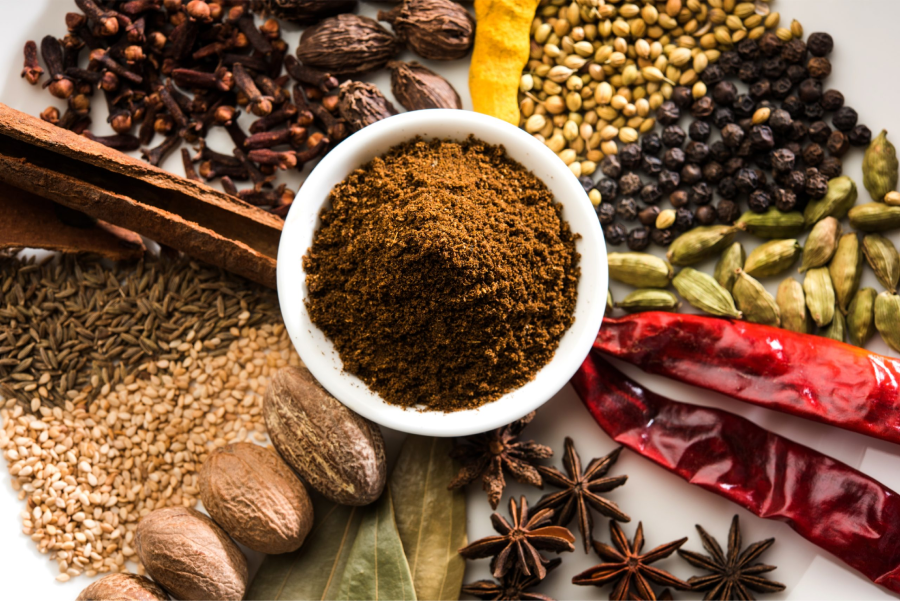
Making Garam Masala isn’t rocket science; you just need all the required ingredients and step-by-step instructions to make it the perfect way.
Here’s how you can make garam masala in just 5 minutes:
Step 1. Roast the Spices
Heat a dry skillet over medium heat. Add the spices one by one, stirring constantly, until fragrant and slightly browned. Be careful not to burn them.
Step 2. Cool and Grind
Let the spices cool completely. Grind them in mortar and pestle to make a fine powder.
Step 3. Store
Store the garam masala in small batches in an airtight container in a cool, dark place.
What is the Best Garam Masala Substitute?
If you’re searching for the best garam masala substitute, you can try the following spice blends with similar flavors in your dishes.
- The best substitute for garam masala is a mix of common spices you might already have in your kitchen. Combine equal parts of cumin, coriander, cardamom, black pepper, cinnamon, cloves, and nutmeg. This blend will give you a warm and aromatic flavor similar to garam masala.
- Another option is to use curry powder. While it has a different flavor profile, it can still add a nice depth to your dishes. Just keep in mind that curry powder often contains turmeric, which will give your dish a yellow color.
- If you have allspice, you can use it as a substitute too. Allspice has a warm and slightly sweet flavor that can mimic some of the notes in garam masala.
- Lastly, if you’re in a pinch, you can use a combination of cinnamon and cumin. This won’t be an exact match, but it will still add a nice warmth to your dish.
10 Health Benefits of Garam Masala
Apart from its rich aroma and distinct flavors, Garam Masala has several applications in Ayurveda. Here are the top health benefits of Garam Masala:
#1. Boosts Body Temperature and Digestion
Garam masala helps raise body temperature, which aids digestion and reduces sluggishness. It also helps flush out toxins, promoting overall health.
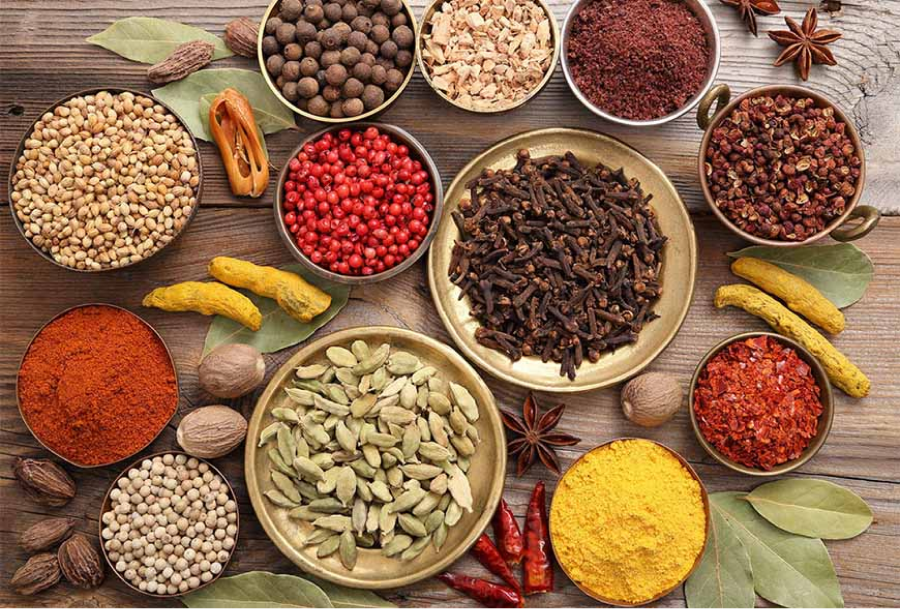
#2. Enhances Immunity
Garam masala strengthens the immune system and can help treat colds and fevers. Drinking garam masala tea can clear phlegm and relieve chest congestion. It also helps prevent premature aging by removing toxins from the body. Additionally, garam masala tea is good for liver detoxification. By improving blood flow and oxygen supply, it helps slow down the aging process.
#3. Helps in Reducing Weight
Garam masala can aid in weight loss. The heat from garam masala causes the body to sweat more. Sweating is a natural way to burn extra fat, which helps in reducing body fat.
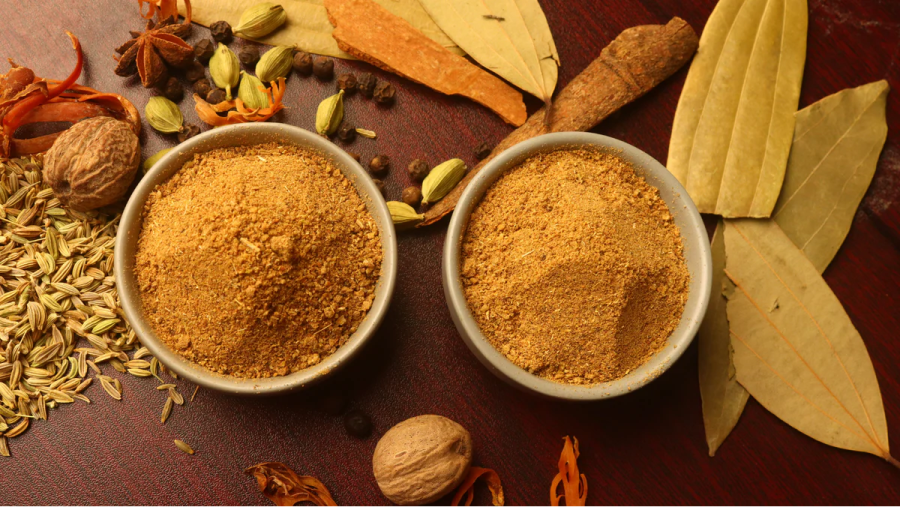
#4. Absorption of Vitamins and Minerals
Garam masala also helps the body absorb vitamins and minerals more effectively. Its spiciness boosts blood circulation and improves oxygen flow. This enhanced blood flow helps the body quickly convert and absorb vitamins and minerals.
#5. Helps Maintain Cholesterol
Garam masala has anti-inflammatory properties that help in managing cholesterol levels. It helps maintain good cholesterol while reducing bad cholesterol in the body. Pepper, a key ingredient in garam masala, helps convert bad cholesterol into energy, making a person more active. Cloves, another component, contain eugenol, which acts as an anti-inflammatory agent and helps tone muscles. Many elderly people experience muscle soreness and cramps, making it difficult for them to walk. Including garam masala in their diet can help alleviate these age-related issues.
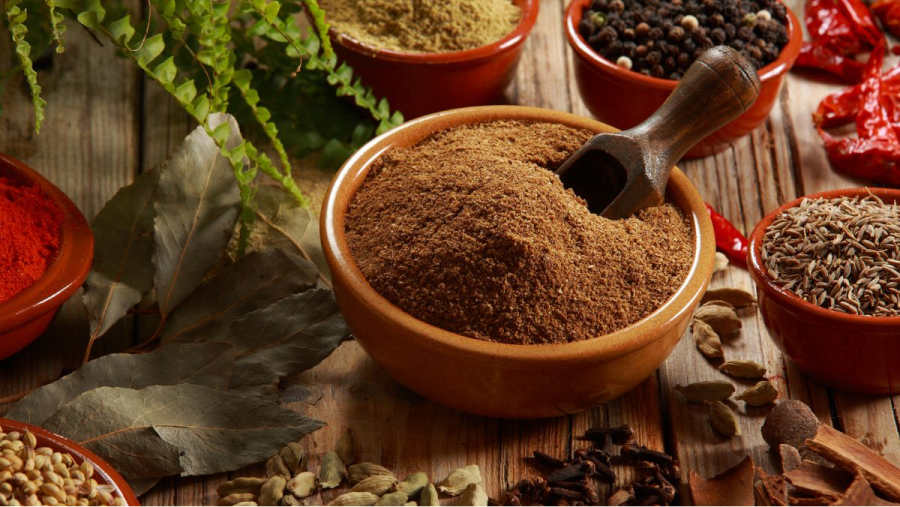
#6. Restores Heart Health
Garam masala is rich in antioxidants, which are beneficial for heart health. Regular consumption of garam masala can reduce the risk of heart attacks and strokes. It is especially beneficial for older adults. Adding a bit of garam masala to their meals or drinking garam masala tea can help maintain a healthy heart.
#7. Prevents Diabetes
Garam masala can help in managing diabetes. This spice blend is particularly beneficial for individuals with type 2 diabetes. Nutmeg and clove, which are key ingredients in garam masala, play a significant role in diabetes prevention.
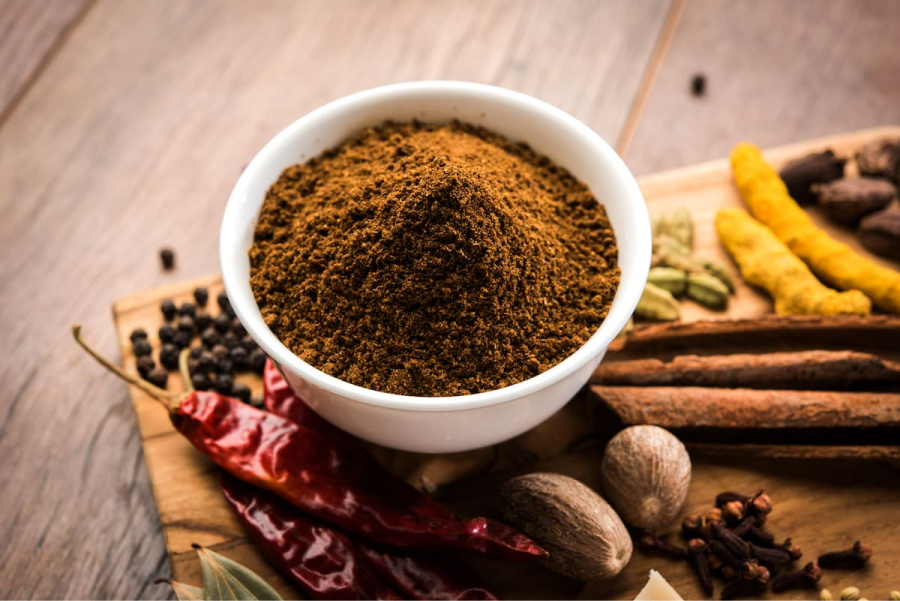
#8. Prevents Cancer
Garam masala is abundant in black pepper, which aids in alleviating constipation. Black pepper is also known for reducing the growth of free radicals in the body, thereby helping to prevent cancer. Regular consumption of garam masala can lower the risk of colon cancer. Additionally, it helps cleanse the intestines and solves issues like bloating, gas, and acidity.
#9. Prevents Arthritis
Garam masala, a blend of spices, is known to help prevent arthritis and gout. Many individuals around the world experience joint and spinal pain. Consuming garam masala can help restore nerve sensory function, providing relief from these discomforts.
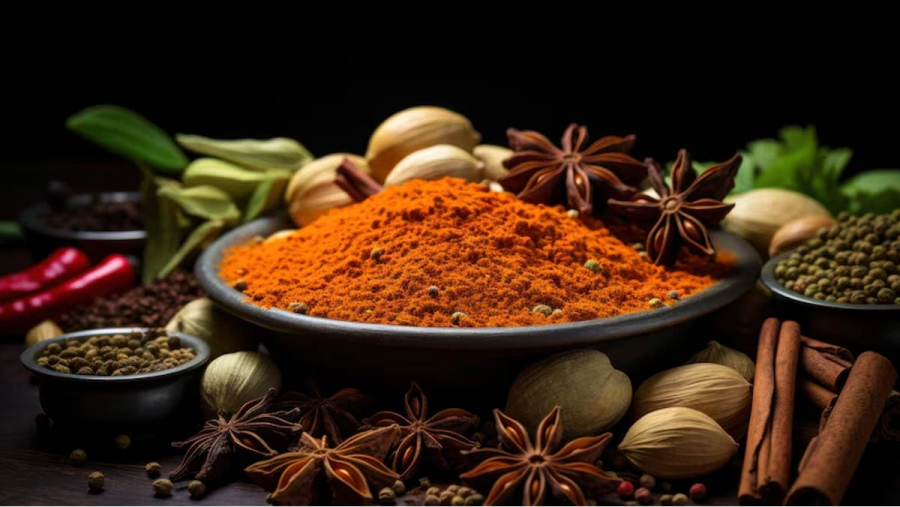
#10. Helps with Premenstrual Cramps
Women who suffer from premenstrual cramps and pains can find relief by consuming garam masala. Irregular blood flow during periods can cause itching and irritation. Adding garam masala to tea has been found to be beneficial in alleviating these symptoms.
Side Effects of Garam Masala
Garam masala can sometimes cause side effects, especially when ingredients like pepper are used in large amounts. For some individuals, it might lead to skin itching or rashes. Others might experience a burning sensation in their mouth.
In some instances, consuming too much garam masala can result in diarrhea and vomiting. Bloating is another issue some people might face after eating a lot of garam masala.
The quality of garam masala depends on the quality of the spices used. Sometimes, spices are treated with chemicals, which can be harmful to the body.
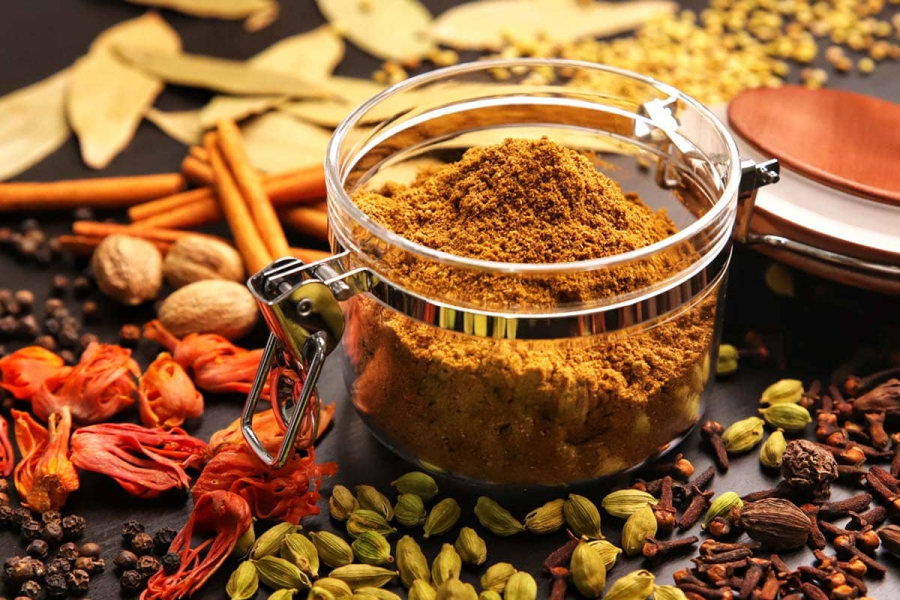
Conclusion
Through this blog, we have shared a detailed recipe for making aromatic and flavorful garam masala at home and listed all the required ingredients. Although this spice blend gives dishes a distinct flavor and richness, you should consume it in moderation, especially in the summer.
At the same time, you will learn about the health benefits of Garam masala and its possible side effects. Hope this blog has helped you with your query – “How to make Garam Masala?” Below, we have answered a few FAQs related to this spice blend for your reference.
FAQs
What’s Garam Masala Made of?
Garam masala is a blend of ground spices commonly used in Indian cuisine. It typically includes coriander, cumin, cardamom, cloves, black pepper, cinnamon, and nutmeg. Variations may also include turmeric, dry ginger, fennel seeds, and bay leaves.
Why is Garam Masala So Important?
Garam masala is important because it adds aroma to dishes. It enhances the flavor profile with its warm, aromatic spices, making it a staple in Indian cooking. Additionally, it has historical significance and is used in traditional Ayurvedic medicine for its warming properties.
How Healthy is Garam Masala?
Garam masala is quite healthy due to its rich blend of spices, each offering unique health benefits. It aids digestion, boosts immunity, and has anti-inflammatory properties. The spices’ antioxidants can help prevent diseases and promote overall well-being.
What to Use Garam Masala For?
Garam masala can be used in various dishes. It’s commonly added to curries, soups, and stews. It can also be used as a seasoning for roasted vegetables and meats and even in marinades. Some people use it in baking for a unique flavor twist.
Is It Safe to Eat Garam Masala Everyday?
Yes, it is generally safe to eat garam masala every day in moderate amounts. It can provide numerous health benefits. However, individuals with specific health conditions like hyperactivity or ulcers should consult a doctor before regular consumption.
What are the Side Effects of Garam Masala?
While garam masala is beneficial, excessive consumption can lead to side effects like heartburn, acidity, and stomach discomfort. Certain spices in the blend may also cause skin irritation or allergic reactions.
Does Garam Masala Increase BP?
No, garam masala does not increase blood pressure. In fact, some of its ingredients, like cardamom and coriander, are known to help regulate blood pressure and improve heart health.
Does Garam Masala Cause Acidity?
Garam masala can cause acidity if consumed in large quantities due to its spicy nature. However, when used in moderation, it generally aids digestion and does not cause acidity.
